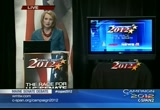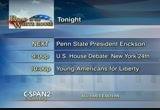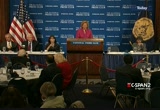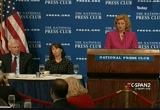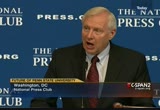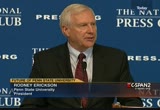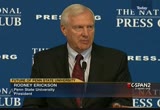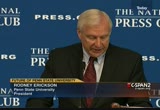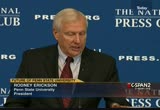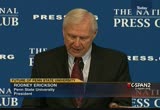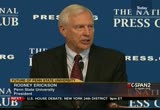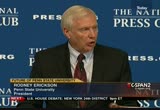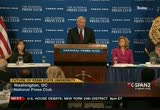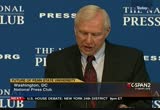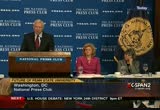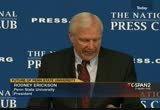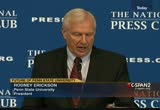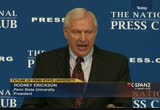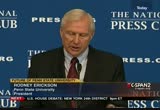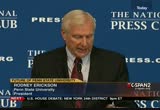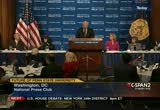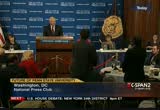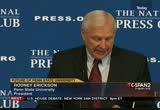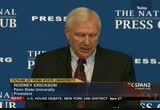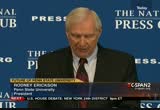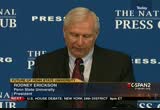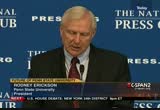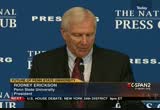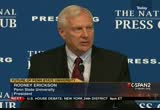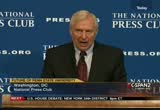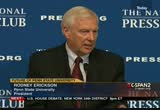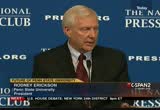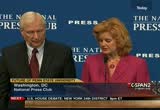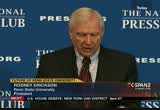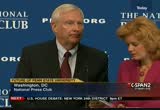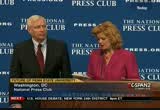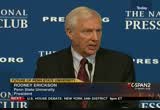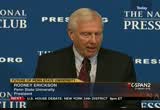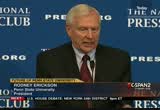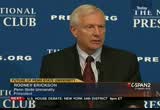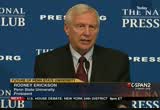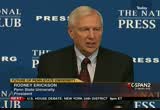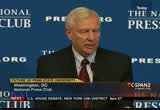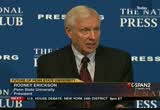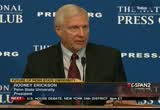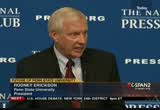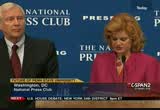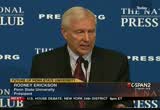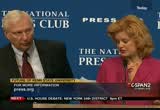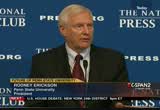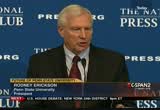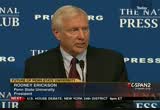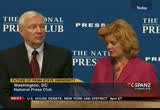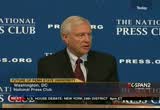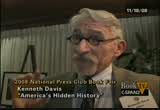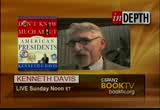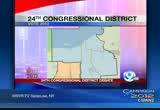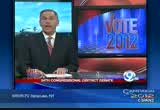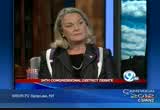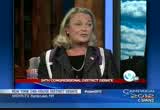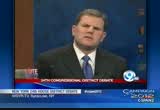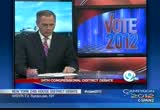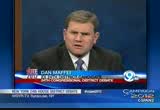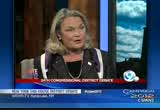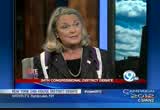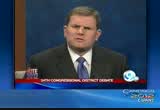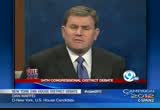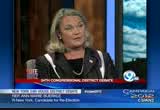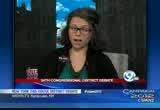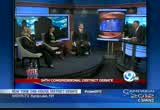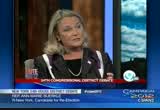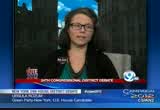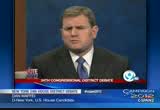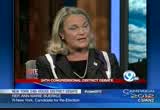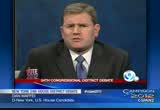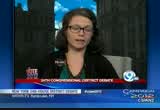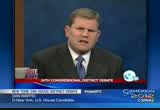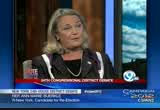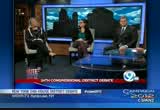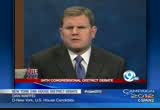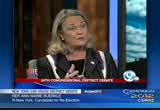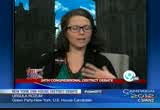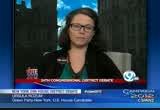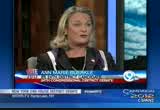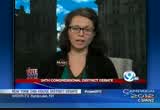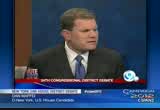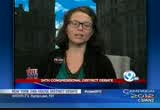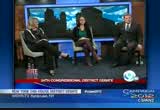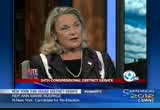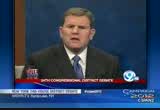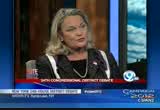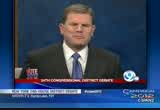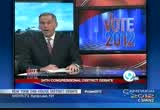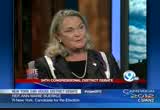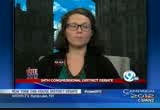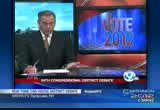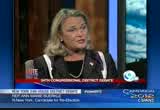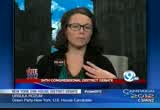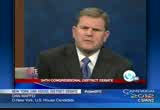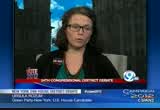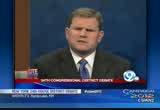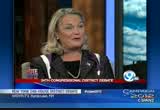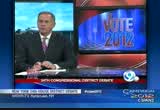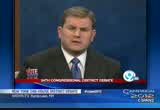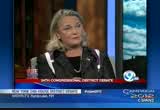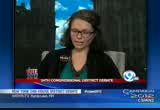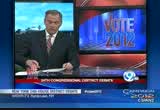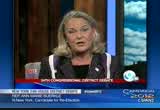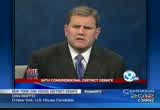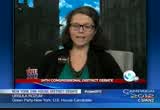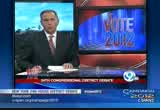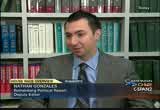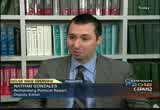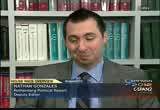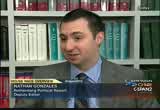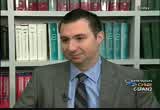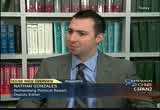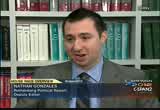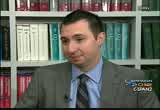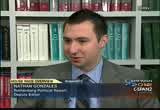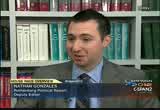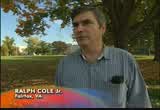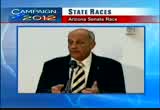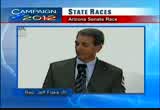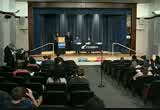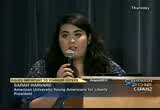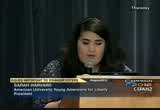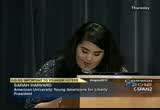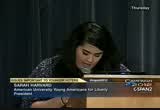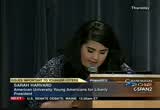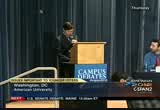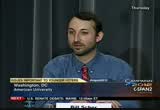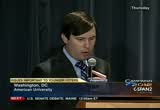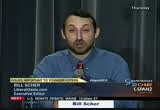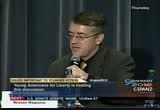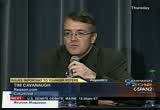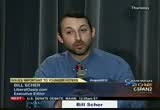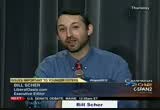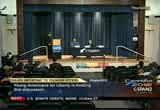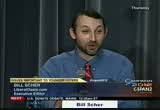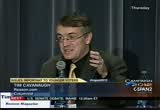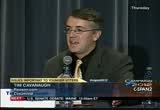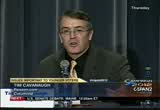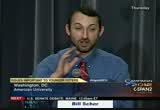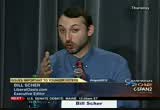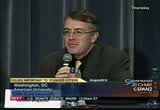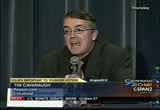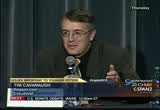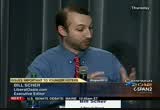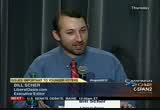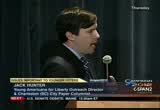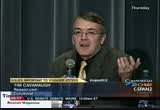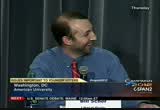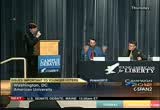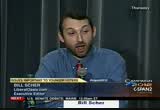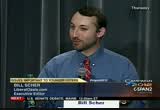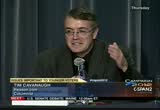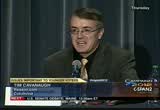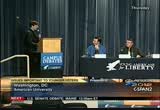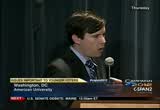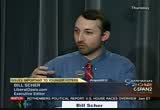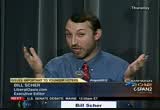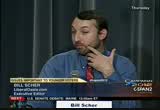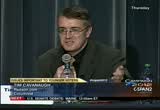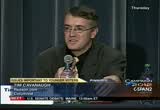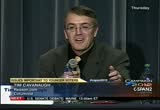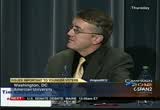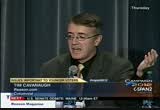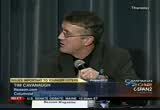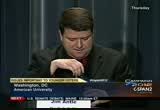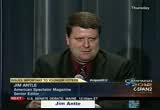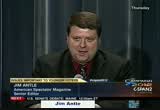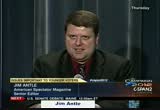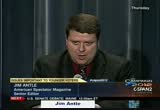tv Tonight From Washington CSPAN November 2, 2012 8:00pm-11:00pm EDT
8:00 pm
have a wonderful night, everybody. have a great weekend. we all deserve it. enjoy. ♪ >> with just four days to the november elections, watch key u.s. senate races tomorrow from around the country. first, reairing this debate from maine with democrat dill, republican summers, and independent king. that's followed by montana senator john tester against republican congressman denny rehberg, and later, arizona congressman flake facing rich carmona. watch the election results tuesday nights and key contests in the house, senate, and governors' races on c-span. tonight here on c-span2, penn state president erikson speaking
8:01 pm
at the national press club followed by a u.s. house debate from new york, and, later, a debate on issues that matter to young voters in this year's presidential election. next, penn state university president speaks about the future of his university, and he'll also answer questions about the on going child sex abuse investigation and the former charges against former university president. this is about an hour. >> it's a picture-perfect college town nestled amid the central hills of central
8:02 pm
pennsylvania. an enormously popular university boasts the largest alumni association in the country, but things were anything but happy when our guest assumed the presidency of penn state last november. the school reeling from a child sex abuse scandal involving long time penn state assistant football coach jerry sandusky. the coverage non-stop, and joe paterno fired, and the former president, forced to step down. both men along with others at penn state accused with covering up the scandal to protect penn state's reputation. this was the mess that rodney inherited. that mess is slowly being cleaned up. sandusky in jail, probably for the rest of his life. the football program has been severely sanctioned by the ncaa, but has a new and popular coach, bill o'brian bringing state to
8:03 pm
the program. the university was fined $60 million, and it's still likely on the hook for millions of more dollars as victims of sandusky file civil suits against the school. a geography professor by trade, he's been at penn state university since 1977. he's been chairman of the geography department and served as executive vice president and provost of the university. dr. ericson graduated from university of minnesota and obtained a ph.d. in geography from the university of washington. innative of wisconsin, he's the 17th president of penn state and planning to step down in 2014. no doubt, much of his time in the next two years will be dealing with the fallout from the scandal and restorying penn state's reputation. please join me in welcoming rodney ericson to the national press club. [applause]
8:04 pm
>> well, good afternoon, thank you president warner, if the for the flexibility given the weather challenges of the week. i'm honored to be here, your appreciation for the penn state and higher education. we need your continued engagement. again, thank you for joining us. thank you for bringing along the penn state cookies. [laughter] according to google news, there's over 45,000 stories about penn state and sandusky. you've written them. you've read them. i imagine that most of you have formed an opinion about penn state and our actions over the last year. beyond the headlines, there's
8:05 pm
another reality, one that exists for penn state's 96,000 students, 44,000 full and part-time faculty and staff, and over 550,000 living alumni. it's a world of teaching, research, and service. it's a world with an $800 million research program, hundreds of degrees offered, 24 campuses, online world campus, academic health center, a law school, and 157 years of tradition. it's also a world that has continued to face ongoing controversies surrounding jerry sandusky, our board of trustees, current and former administrators, and me. the legal process continues to unfold as evidence by the attorney generals further charges leveled yesterday. today, i want to tell you something about my world with the realities of running an institution the size and scope of penn state while dealing with
8:06 pm
widely divergent perceptions. i want to share the many wonderful activities and accomplishments of the students and faculty and staff over this agonizing year. by any reasonable definition, they are newsworthy stories. i understand that you may not be willing to listen to them until we show you how this year has changed us. what we learned about ourselves and what are we trying to do with that knowledge? i will speak candidly about how the last year affected penn state, and how the impact has gone beyond central pennsylvania to shape policies at colleges and universities across the nation. i'll share our strategies for the year ahead. to begin, let me take you back to last year when penn state received the repug innocent news a former assistant coach molested young boys, in some
8:07 pm
instances, on our campus. immediately, as they did with all of you, our thoughts turned to the victims of the horrific crimes, and in the days that followed, we saw the removal of the senior leaders of our university and athletic program including the popular president and iconic football coach. at the time, i was serving as the executive haven't and provost, a position i have often called the best job in higher education. my retirement was within my sights. [laughter] when the board of trustees asked me to serve as president, i accepted knowing full well that the months ahead would explore uncharted territory for our university. many times i've been asked why did you say "yes"? the answer has never changed. i devoted 35 years of my professional life to penn state. my children attended penn state.
8:08 pm
i believe in our mission and ability to contribute to the greater good. i knew i needed to step up and serve. i also knew that penn state is a great university, a great university that will endure as it has always endured. we'll recover. we'll continue to advance teaching, research, and service. in those early weeks, i heard from penn state's many constituents through more than 5,000 e-mails and letters and hundreds of phone calls and personal contacts. people were shocked, upset, concerned, disappointed, and yet, supportive of the university. meanwhile, as the story played out in the media and alumni circle, and in every corner of our campuses, voices that had remained silent for many years began to speak up. victims of child abuse wrote to my office. these individuals were abused by
8:09 pm
family members and acquaintances. indeed, only 10% of sexual abuse is perpetrated by a stranger. they were part of the chilling estimates, one in five girls, and one in ten boys are sexually abused by the age of 18. the majority of the victims will never tell anyone, even if they have been so-called. the letters were powerful, expressing bottled up pain, shame, and strung -- struggles the individuals lived with over many years. for some, this was the first time they shared their story. another has written regularly and met with some of my top administrators to collaborate on ways to help victims of child sexual abuse. i found these stories to be heart breaking, but i also found hope in them. those who wrote were entrusting stories to us, and more importantly, they were looking to us to help tackle what is an
8:10 pm
assiduous, hidden, and difficult issue. they believe in our difficulties, even as they wrestle with what happened. their issue is our issue, and we resolve to move forward to renew what is right about penn state to take on the nationwide problem of child abuse, and we resolve to do it by doing what we do best -- that is teaching, research, and service. beyond that, we have something even more powerful -- our student body. within the first days of the crisis, it became clear the students with respect going to wait for us to lead them. they were moving forward with unity and a constructive energy that's been inspiring to all of us. here are just two quick examples. by the end of the first week, student leaders organized a candle light vigil on the old main lawn to show support for the victims of child sexual
8:11 pm
abuse. thousands of penn state students and community members joined together in the stillness of a cold, dark night to remind others that at the core of the issue we faced, were children who were gravely harmed. the following week, graduate students laura and stuart, mobilized the penn state community with the goal of raising awareness and funds for combating child abuse. working with the tight time line right before the lions were to play their first football game in the aftermath of the tragedy, laura and stuart organized the first annual blowout to represent the color of ribbons shown in support of child abuse awareness. this year was the second annual blue-out. together, they raised $126,000 for prevent child abuse pennsylvania and the pennsylvania coalition against rape. laura and stuart, please stand
8:12 pm
for a moment so we can recognize you. [applause] thank you. pen state alumni also have shown support raising nearly $550,000 for rain, the country's largest antisexual violence organization. those are just a few examples of many acts, large and small, that were organized and carried out by penn staters. what's more? students continue to respond to the crisis while still doing the things penn state student have always loved to do, study and learn, participate in clubs and activities, make friends, look forward to the future cheering on 800-plus athletes in 31 varsity sports, and a football team, i might add, whose
8:13 pm
performance on and off the field make us proud. as administrators, we balance the need to move ahead, and reflect on correcting the underlying issues that brought us to the crisis in the first place. the trustees began by asking former fbi director free to lead an independent investigation which yielded 119 recommendations on how to enhance our internal policies and practices. we've already implemented more than one-third of the recommendations, and many more are nearing completion. we remain p committed to the process because we believe it made us a better, stronger university. we're committed to the fight against child abuse. central to this effort is the newly established center for the protection of children based at the penn state hershey hospital and ongoing partnership with the pennsylvania coalition against rape. earlier this week, we completed
8:14 pm
the first penn state national conference on child sexual abuse. this forum, brought together leaders, experts from law enforcement, pediatric medicine, prevention research, and education. we formed the penn state network for child protection a and well being comprised of 35 faculty members with interdisciplinary expertise with the aim to accelerate the pace of discovery by linking research and practice and build the network with additional researches, practitioners, and teachers. dr. susan mckale, director of the social science research institute and a co-organizer of the research is here today. susan, can you please stand to be recognized? thank you. [applause] we also made a pledge to educate the university community about ethics. it's one thing to know the rules, regulations, and
8:15 pm
policies; it's another thing to create a culture where every employeements to do the right thing the first time every time. through training and awareness building efforts, we're trying to help people understand the how, when, where, and why of reporting. i assure you that penn state takes this commitment very seriously. that's not a glib promise. to prove it, we stepped up efforts in compliance. like most universities, penn state has dozens of compliance professionals. they're responsible for ensuring research funds are appropriately used, they monitor the nca compliance, the financial reporting, conformity to federal laws covering privacy rights and crime reporting, and they administer regulations related to the health, welfare, and safety of those on campuses including our patients. what we've discovered, however, is that despite our staffing, there were gaps in the system,
8:16 pm
and we lacked a central compliance office where the efforts can be coordinated. we have sense hired universities first full-time compliance coordinator to ensure pen state's overall compliance with the act. with the new position, our goal is not not only ensure that penn state meets the requirements set forth by federal law and the u.s. department of education, but to become añ&r leader in cas safety, security, and compliance. another example of is the athles integrity intreement between the ncaa and penn state. this should help put the question of athletic integrity to rest as we implement changes. there's a great deal that's right about athletics at penn state. our student athletes graduate well above their peers nationwide. this year, they earned an 88% graduate success rate compared to 80% for all division i
8:17 pm
schools. the football team's rate is 91%. this level of achievement spans all sports teams, academic majors, and ethnicity. notably, african-american student athletes earned a record 90% rate, 25 points higher than the national average. indeed, other universities are closely watching penn state's actions so theyñ&r can stengthen their policies, mitt gait risk at their institutions, and make their campuses safer. states from california to florida have introduced legislation to make it clear that child abuse reporting is not only a moral duty, but it's the law. this is tremendous progress. laws strengthens, policies tightened, governance revisited, and institutions made safer, and our work continues. that brings us to today, on the
8:18 pm
brink of the one year anniversary, civil lawsuits, perjury trials, and we can expect more fallout to come. over the last year, we have learned much about ourselves, our many cultures, our values, and our vision. we're still working through some difficult issues, but the question remains where do we go from here? the answer can be found by returning to penn state's core mission -- teaching, research, and service. our bottom line is delivering an outstanding education to students. our students are our top priority. i repeat, our students are our top priority, and they are doing great things. for example, this year, our journalism students captured the national championship in the william randolff hurst journalism award. engineering students took top honors in the ecocar
8:19 pm
competition. others race to get their vehicle to the moon in the lunar x prize competition. meteorology students won the forecasting challenge, and notably this week, more than 3400 penn state meteorology alumni tracked hurricane sandy for the government, private industry, the military, media, and education. in addition, this fall, we welcome one of the largest and most academically accomplished classes in our history after receiving a record 123,000 total applications for admission. these successes dwieb who we are and where we are going. we need to support those students and faculty members because they depend on us. our alumni and people of the commonwealth of pennsylvania depend on us for educational opportunities, economic development, and competitiveness, and our nation depends on us for ground breaking research and training for the next generation of
8:20 pm
leaders, scientists, thinkers, and teachers. allow me to put a few faces on the penn state community. will cat powers and will martin stand? cat and will, student leaders working to fight pediatric cancer through the largest student-run philanthropy in the world. since 1977, they raised more than $89 million for the four diamonds fund at the hershey medical center. we brought dvds of the documentary, with "why we dancer all of you. pick up a copy on the way out. it's an incredible story. thank you, will and cat. [applause] well, dr. kathy bowen, will you stand? a professor of agricultural and extension education of consumer
8:21 pm
issues. in addition to a full-time teaching and research agenda, she runs a volunteer service to help income ineligible people get taxes done for free. last year, completed 700 tax returns saving the elderly, working families, and students at least $133,000. the program's total economic impact was nearly $1 million. thank you, kathy. [applause] finally, i want to introduce dr. report paulson, professors in the college of agriculture sciences. could you please stand? their inspiring collaboration discovered what could be a promising treatment for leukemia. in laboratory tests, the compound they developed targeted and killed leukemia stem cells without relapse. their team, including undergraduate, as well as graduate students is now working to move this compound into clinical trials as soon as
8:22 pm
possible. thank you, bob and sandy. [applause] these are penn staters leading us into the future. they are the people i work for every day. they are the reason i'm here today, and they are just a few of the penn staters who will not allow anything to stop them from changing our world for the better. with that in mine, i want to spend a few minutes looking ahead because we're facing a crisis in early education, perhaps the worst ever in our nation's history. our young people from middle class, working families, people like cat, will, laura, and stuart, who, for generationings, have depended on access to affordable community colleges and state universities. they are now at risk of losing that access. throughout the nation, state government are cutting back on the funding that helps keep tuition affordable, and the cuts
8:23 pm
threaten the system of public higher education that began when abraham lincoln signed the moral land grant act 150 years ago. a report by the national science board released just last month found state support for public universities fell 20% between 2002 and 2010, and this short fall has put public research universities in peril. the declining investment in universities has made this a lost decade for funding, and, worse, it has happened while universities have increased enrollment by 320,000 students nationally causing many to begin to question the future of public higher education and the implications for society. this is not a chicken little warning. as a university president, i'm acutely aware that we need to adapt to today's economic realities. to be sure, state legislatures
8:24 pm
and governors have tough choices. their ability to provide government services has decreased while the public's need for them increased. we know the difficulty of asking already hard pressed americans to pay higher taxes to subsidize public university tuition to enable lower and middle income families to afford to send their children to college. we must address the current reality that our nation's public universities are charging tuitions that even in state students find increasingly out of their reach. without a doubt, everyone in leadership at public universities can and must do a better job of reducing costs and improving education. further belt tightening must occur on university campuses everywhere. every member of the university community shares that responsibility. we, at penn state, know this, and we turn over every stone to
8:25 pm
find savings and efficiencies improving learning outcomes. this year, we had the lowest tuition increase in 45 years. we have trimmed budgets, cut programs, and consolidated functions. you can't do 21st century science in labs leftover from the days of sputnik or before. as the ceo and psychologist shawn acore said, if we study what is merely average, we are remain what is merely average. our students and our nation deserve better, and we must do better if we intend to compete in the global economy. last year, i traveled to china, and i visited several universities. the gnarl investment -- national investment in these universities, research facilities, and higher education is something to behold. over the last 30 years, china has had a 58-fold increase in spending in education, health, and social investments. according to o report from the center for american progress, by
8:26 pm
2030, china will have more than 200 million college graduates, more than the entire u.s. work force. in five years, india will be producing five times as many college graduates as the united states. these are the facts that drive the decisions we must make as we position penn state to succeed in the future. part of that strategic planning requires getting out and staying out in front of the information technology revolution, which has been among the most significant drivers of educational change in the last 15-20 years. it's also been like a run away train. one response to the higher education funding crisis has been increased appeals, especially from legislatures and business leaders for higher education to drastically increase online education. the hope is that more students receive college degrees faster and at less cost.
8:27 pm
in fact, research shows, done appropriately, the application of technologies can both improve learning outcomes and decrease the costs of delivering that education. so far, big safings have proven allusive. nonetheless, massive, open online courses are testing the market. dozens of universities including mitt, harvard, princeton and stanford offer these classes with headlines that "college may never be the same." stay tuned, it could be a wild ride. ideas take time to research and explore. penn state operates a world campus with nearly 12,000 students enrolled in dozens of fully online programs. the model was honored as the top line line program in 2012, and it, too, continues to evolve. finally, in the coming year, we
8:28 pm
must prepare penn state for the next generation of leadership. i announced that i will be retiring by june 2014, and the board of trustees is about to begin the search for the next president. it's incumbent upon us to lay the ground work for my successor, and we look forward to an invigorating process with many outstanding candidates. penn state continues to move forward and embrace the challenges, not only those coming from the events of the past year, but those that come from being part of the higher education landscape, a large public landgrant research university, and, yesterday, a university that continues to believe that great academics and great athletics cannot only co-exist, but be reenforcing components of a university education. i hope you can better understand why i'm proud to be president of our university. it's because of our students,
8:29 pm
faculty, staff, and hundreds of thousands of penn state alumni and friends. our difficulties are not over, but i assure you that penn state's best days are still ahead. again, thank you for the opportunity to share these thoughts with you. thank you. [applause] >> the free report claims penn state officials, including the former president, were aware of and dlitly concealed san jusky's abuse of children. do you truly believe he was aware of and deliberately concealed jerry sandusky's abuse of children? >> i'm not going to comment on that because it is an ongoing ingest gages. it is the -- investigation. it is the subject of continuing litigation, but, you know,
8:30 pm
obviously, all of us at penn state have been deeply hurt, deeply moved by everything that's transpired. yesterday was certainly no exception either, but we have to trust the courts now to adjudicate these matters, and allow the legal process to run its course. >> the penn state board of trustees repeatedly said tim and gary get due process. why was president spani eric r not given the same consideration? >> in november of last year, the board made leadership changes. their rationale for the changes had been that the president had
8:31 pm
not fulfilled leadership obligations in subsequent indications with the media and indicated this was primarily issue the of not keeping the board informed of developments that occurred over a long period of time as well as making statements that were not in concert with the boards wishes in early no vetch -- november. >> where are the meeting minutes from november 9th, 2011, and why are they the only ones not publicly released even after repeated requests and legal requirement to do so? >> >> i -- >> i was not there, obviously, so i can't answer it in completeness. i was told there are no minutes that were taken at that meeting.
8:32 pm
>> what is the overlap of the personnel between the second mile and those of the penn state's employees and donors and why were the conflict of interests not identified in the report? >> we may be able to get you that information, but i certainly don't have it. i was never, myself, involved in any way with the second mile in either of the fundraisers or official activities so i -- i do not have a knowledge, a working knowledge of who would have been back and forth with respect to service of the university and service of the second mile. >> there's been widely reported contra kick contradictory responses in the investigation
8:33 pm
and subsequent reports. can you explain how the scope of work was outlined for free and the real purpose of the investigation and report? >> as i understand, judge free was given a broad mandate to look at the sandusky situation to try to discern what happened and what went wrong. beyond that, to make recommendations on how the university could improve its policies, practices, and operations.ñ&r as i indicated in my remarks, judge free identified 119 recommendations, and indeed, many suggested by the more than 4 # -- 400 individuals that the judge's team interviewed over the course of several months. we have focused as an add
8:34 pm
administration on putting as many of those recommendations and, really, the idea to put them all into place as quickly as possible. the board responded quickly to the recommendations, and has also taken a number of actions since last november including changes of the board leadership, revising the committee structure, creating six meets that are very responsive to the functions and needs of the university. there's tremendous amount of work that's going on. i appointed three senior leaders to oversee the implementations of the recommendations of the free report. we've made a tremendous amount of progress and continue to with the goal of having all the recommendations completed by the end of calendar 2013.
8:35 pm
>> a follow-up question to the board. all meetings recorded. why was the november meeting an exception? >> again, i was not there. i have no knowledge of that. >> have you asked? [laughter] >> plenty of other people have asked, but i was simply told, yes, i asked, and i was told there were no minutes of that meeting. >> did you ask why?ñki >> yes, i asked why, but the actions that were taken there, i think, were the subject of that board meeting, and, again, i don't respond to questions that i was not there or don't have information about. >> how do you address the fears, concerns of alumni giving into the ncaa sanctions without
8:36 pm
dispute feeds into the story line that penn state had a culture that football was put above all else? >> well, first of all, let me say that accepting the ncaa concept decree was the most difficult question and decision to make in 40 years now of a professional career. i laid out reasons in public why i made those decisions, but, clearly, the alternative which was multiple years of the death penalty, i simply felt was too devastating for the university, the community, and i thought that even though sanctions imposed were unprecedented and crippling in many ways, it was the better alternative, and also allowed us to move forward as a
8:37 pm
university so i made that decision, and i stand by that decision. >> did you personally sign the retirement package to jerry giving him access to the penn state campus? >> no, i did not. the only role i played there as provost, the president awards or chooses not to award ameritus status. in 1999, when jerry was awarded that status, the policy was, in essence, nothing more than a title, and the concerns i expressed about that in an e-mail that was producedded in the free report was only concerned with the precedent that might set of someone at the assistant rank given that status, but i played # no role in any of the kinds of matters
8:38 pm
related to what mr. sandusky was entitled as a member of the faculty and staff. i had no role in that whatsoever nor did i see the document. >> with the benefit of hindsight. with the investigation completed, he was not charged with any crimes, what should penn state have done differently regarding the access to psu facilities? well, clearly, there should have been additional follow-up. we know that. that's really why we've done so much over the course of the last year to put the kinds of policies into place that we have. we have secured facilities in new ways. we have changedded the ways in
8:39 pm
which retired faculty and staff have access to our facilities. we've implemented background checking, and people are volunteers for many, many reasons. we've strengthened reporting laws, procedures, and within our police and investigative services, we strengthed all processes and procedures that will make it very unlikely this sort of thing could ever happen again. >> will you release a copy of the $6.5 million contract allowing the free group to do their investigation? >> that's a decision for the
8:40 pm
board, and that should be directed to the chair of the board. >> four penn state trustees named in the free report having prior knowledge of the sandusky grand jury investigation dating back to the spring of 2011 and doing nothing about it. only one of those trustees, steve garbin, so far resigned. why are others still holding their trustee positions? >> well, again, that would be a question that would be best directed to them. i would have to say that the board has made very, very significant changes over the course of the past year. i mentioned many of the changes made to the structure, i would also say that the oversight of the board has increased dramatically. as i said, there's no leadership, and i have regular contact, virtually, on a daily
8:41 pm
basis with the leadership of our board. i think other members of the board feel very much empowered to reach into the ranks of my senior staff to request information, to raise issues. it's really a very different kind of oversight environment that i think will serve the university very well. >> many of the pitfalls of the previous administration and board of trustees at the time were due to poor communications and accountability between the office the president and leaders of the board. how have the free recommendations and lessons learned improved that community cation, and what processes have been instilled to ensure both groups of leaders are fully aware of what each is doing? >> i think i addressed african -- i think i addressed much of that in my last response, but it has been a year of much more frequent meetings, much enhappensed interactions. the board is fully aware and
8:42 pm
very well briefed of any major issues that are taking place at the university, and i would also say that one of the objectives in my administration has been to create more interaction among my senior leadership team so that whenever any issues come before the university, that come around our table, we're discussing them in the broad group of about 18 members who make up part of my -- who make up my president's council. >> the free report concluded they intentionally covered up knowledge of sandusky's child abuse to protect the rep stition of the football program. on what grounds do you think they reach the conclusion, and do you think it's fair and accurate? >> that's a question that is best directed to louis free and
8:43 pm
certainly the legal process that's going on that's continuing and the investigation continuing will hopefully lead to some conclusions with that with respect to that question. >> did the university consult with legal counsel to determine how accepting the cop collusion about the evidence might be looked upon as an admission of guilt and expose university to greater little and civil suits against the university? >> the university certainly thought about that, and, of course, the report was commissioned by the board of trustees, and the board of trues trustees accepted that report. i would say that doesn't necessarily mean that members of the board of trustees agree with every aspect of the report, but we certainly agree with the recommendations of the report, and we are moving ahead very
8:44 pm
swiftly to implement those recommendations. >> who first suggested the use of the death penalty as an appropriate penalty handed down from the ncaa, you or mark? >> mark. >> in your opinion, what possibly could have been uncoveredded in an ncaa investigation of penn state that would have netted a worse result than the current sanctions? >> well, i don't know what kinds of other issues there may have been, but i can't imagine a worse outcome than the death sentence, the death penalty and multiple years of that. you have to understand that would have not only erased tremendous source of revenue that helps to support all of our
8:45 pm
intercollegiate athletic programs, but we would have had years of continuing costs given all the contracts and all of the commitments that we are related to football. the loss of television revenue, of course, would be very, very substantial as well. the impacts on the local community, which over the course of seven games are absolutely huge in a small community like ours, and certainly, the sanctions we accepted unprecedented and severe as they were still allowed us to continue to play, and i have to say how proud i am of our football players. these young men have stuck with us. they have, for the most part,
8:46 pm
90% of them stayed with coach o'brian and the staff, played hearts out during the fall, and i believe they will continue to. they have really acted like the true champions that they are. i don't care what their one loss record is, they are champions as far as i'm concerned, and they reflect how we'll get through this process. we will come out stronger in the end. >> who proposed the final version of the sanctions? penn state or the ncaa? >> we had little that we were able to negotiate, if you will, in terms of the ncaa sanctions. we were not in a negotiating position, and the nca had made that very clear to us. >> did you brief the trustees about the negotiations with
8:47 pm
mark? >> yes, i brought the executive committee of the board into the loop early on that week, and kept them informed throughout the processing inning sunday night at the latest before i put pen to paper to sign it. >> what role could the legacy of joe paterno play in penn state's future? is there a future where joe's legacy is restored? >> this is certainly an issue that has great importance for the university community. joe paterno was a larger than life figure for much of his 61 years at penn state, and certainly left an important legacy for the university. i certainly, in making decisions
8:48 pm
that i did, i thought it was most appropriate that we leave the paterno name on the library given the many contributions to education that coach paterno and his family had made over the years. i think that's a very, very fitting tribute to have that name yet on the library. as to how the university would entertain other ideas, i think that's something that we'll have to give it some time. there are lots of differing opinions about this, and i hope at some point we'll be able to address that with the sense ofupty and reflection. >> how do you think alumni have reacted to the steps the university has taken to repair
8:49 pm
and improve the damage of the reputation that their alma mater? >> there's a lot of different thoughts out there. it clearly has been been difficult to move the positive forward what we had what seems like a continuing stream of bad news that's come out over the course of the last year, but we are moving forward with the help of individuals such as i introduced you to today, and we need to continue to do that. we need to talk about the wonderful, tremendously positive things that are happening at penn state day in and day out because our mission has not changed one ioada over the last
8:50 pm
year. we're about teaching research and service. we're still the great institution we were a year ago. we're still a place that corporate america most likes to come to hire graduates. all of these things are there. all of them are still in place. we can't forget that, even as we, as we deal with some of the issues that continue to arise. >> what was the reaction on campus yesterday to grahm's charges? >> i had relatively few opportunities to interact with individuals during the day in an informal discussion atmosphere. you know, i'm sure that there was emotion. there was a lot of concern.
8:51 pm
he was very well regarded among the student body and certainly among the faculty so i think we'll have a better opportunity to assess that over the next few days and the weeks ahead. >> given new charges, are you being investigated for any role in the scandal? >> not that i'm aware of. >> how is settlement negotiation going? why is the university not forth forthcoming on how much it pays the negotiators? >> kent feinberg and mike were brought on really as intermediaries. they don't represent the university or victims. they are there to try to engage
8:52 pm
a discussion and écj=a a process that both the university, the insurance policy carriers, and the plaintiffs can get together around. ideally, we'd like to settle all cases if it were possible, but even some number of them, if we could settle them without taken the victims through a litigation process, that would be very preferable for everyone i believe, and they'll continue to try to move the process forward over the next few weeks, over the next few months, and hopefully help us bring resolution to the matter in a timely and just map -- manner. >> what's the status with the university's fight against one of the insurers over a general liability coverage?
8:53 pm
>> the issue there really is about whether they're going to provide coverage, but let me first give you background here. like other organizations of our size and scope, like our peer universities, we have multiple stacks of coverage. the layer from the, that you're referring to, is simply the first layer in coverage that we've had and maintained for about 60 years. none of the subsequent coverage is dependent upon what happens with that layer. >> what would be the university's response if they are found not guilty of the charges endangering the welfare of children and failure to report child abuse because isn't that what the sanctions are largely based on? >> well, we'll have to wait and see how all of this turns out. i'm not going to speculate on
8:54 pm
those kinds of what-if situations at this point. >> okay, a couple minutes. i have a few announcements to make before we get to the last question. first of all, i'd like to remind you all of our upcoming luncheons on november 12 with the lead singer of the who discussing the ucla teen and young adult cancer program. on november 16th, admiral john green, chief of naval operations speaks. secondly, i want to present our guest with the national press club coffee mug. >> oh, wonderful, thank you. >> makes all the beverages taste better. lastly, i'd like to ask what is your one major goal you want to accomplish before you leave your role in twoñki years? >> may major goal is really to
8:55 pm
set the stage for my successor so that she or he can come in and really take the reigns of this great university that's penn state, continue to drive us forward, to do wonderful things, and my goal is really to make that happen and continue to serve our faculty, staff, students, and alumni in the best possible way i can in the time that i have left. thank you. >> how about a round of applause for our speaker today? [applause] thank you for coming. [applause] i'd also like to thank the national press club staff including journalism institute and broadcast center for organizing today's event. finally, here's the reminder to find more information about the national press club on our website. also, if you'd like to get a copy of today's program, please
8:56 pm
8:57 pm
american history that we don't know about. the first pilgrims in america came to -- came 50 years before the mayflower. they were french, made wine, had a good sense to land in florida in june rather than december in massachusetts, but they were wiped out by the spanish. we left this story out of the textbooks. the most famous woman in america, she was taken captive by indians in 1695, marched into new hampshire. in the middle of the night, killed her captors, realized she could get a bounty for indian scalps, went back, scalped them, and went to boston where she was a hero in. they erected a statue to her, the first statue of a woman showed her with a hatchet in one hand and scalp l in the other. >> kenneth davis, taking your questions, and the most recent, "don't know much about american
8:58 pm
presidents," watch live on booktv on c-span2. >> just a few minutes ago, i called vice president bush and congratlated him on his victory. i know i speak to you that he'll be our president, and we'll work with him. this nation faces major challenges ahead, and we must work together. >> i've just received a telephone call from governor decaucus. [cheers and applause] i want you to know that he was most gracious. his call was personal. it was genuinely friendly, and it was great tradition of american politics.
9:00 pm
>> if you're a registered voter, you have a choice to make this year. among three candidates on election day. the polls are accurate, every vote will matter. this race is considered a tossup too close to call. if you are undecided tonight come in the next hour may help you make up your mind. in the center of your screen is the green party candidate for congress and on the pyrite is democrat than mcveigh, calendar for this evening as well. each candidate tonight will have
9:01 pm
16 seconds to answer my questions. and we will allow questions as needed. an additional 30 seconds will be added to each candidate to debate each other. the very first question will be answered by congresswoman ann-marie. it shows not redline and takes off, the combining of medicare and medicaid, social security and the interest on the national debt, all of those combined will exceed total govern unchecked government revenue by the year 2025. by 2040, 50% more than all the government collects in taxes. and that assumes that the tax collection levels will be about 20% of gdp, which is a big bet.
9:02 pm
and so, congresswoman ann marie buerkle. it's clear that taxes will get the job done come how you solve this problem? buerkle: thank you for hosting the event today. as evidence of what you showed us, we have a problem in this country. must we look at where money is going, right now the entitlement system and the way it is set up, they perpetuate themselves and they are not looked at. there are no changes being proposed and we know how dramatic medicare and medicaid spending is going up. it is a tremendous burden on her counting. we have to cut cabin balance will be cut spending and we kept our spending and we put a balanced budget and to place so that we have a spending plan. the problem is, that the senate has failed to take up the
9:03 pm
budget. it is very difficult to negotiate. >> moderator: ursala rozum? rozum: i support the tax cuts now. we need to have those over $110,000 contributing to social security. to stabilize health care costs, stabilize medicare costs, i'm in favor of medicare for all. this is the most cost-effective system because it takes the process that is going to the private insurance bureaucracy. and put them into care area we are concerned about preserving these programs are are the people that need them from the working people in central new york, we do need to reform how the program works.
9:04 pm
9:05 pm
>> moderator: even under the affordable care, medicare as we knew it, wouldn't survive much beyond the next decade or so. what specific things we do for medicare to make sure that redline doesn't keep going right through the group. rozum: patients need to have choices of doctors. medicare does stabilize cost. buerkle: >> moderator: mr. maffei. maffei: we have added nine years of solvency.
9:06 pm
but we need to get health care costs down. that would mean that it would be $6000 short of what they can afford now. >> moderator: ms. buerkle? buerkle: there have been a number of distortions that have been promoted. this is one of them. the affordable care act, as you pointed out, cuts medicare for current seniors at $700 billion. medicare has been changed for our seniors right now, unless we repeal the affordable care act. ryan budget is not a voucher
9:07 pm
program. it is a needs-based government supported premium program. it has bipartisan support. the plan was, as you become eligible for medicare, you have choices. you can shop around for a medicare plan and have the government subsidize and provide premium support for you. but it is a needs-based. i think that the scare tactic for our seniors has been really reprehensible. >> moderator: he had to do that
9:08 pm
by law, right? anyone but ryan's members of the affordable care act, the affordable care act uses the $700 billion to fund the entitlement. what ryan did you put that money back into the medicare system to make it solvent and to make it healthier to the current seniors receiving medicare can be there for them. >> moderator: ursala rozum, you get 30 seconds. rozum: it shows how complicated and it's optional our health care system is.
9:09 pm
there are some cuts she supported. but i just don't medicare and social security to be solvent for people over 55 years old. i wanted to be solvent for future generations. because it has been such an important program that has given bedrock support. that is why i will fight for. >> i know where you stand, i will give each a minute to talk about it. what parts need changes in health care law? reports would you change? maffei: there are several areas that we need to make changes with. part of the problem, it is not going to happen. and there are a lot of things in it that are very important. for instance, we need to stand
9:10 pm
up to insurance companies and we can't just give away this and send seniors out in the private insurance market and say, okay, go fend for yourself and hopefully the private insurance companies won't take advantage of you. what we do do is make sure that people have coverage even with pre-existing conditions. we make sure that people don't face lifetime limits. i knew a woman who passed away of cancer. she was not only cancer patient, but an advocate, and she ran into so many people who had to deal with observation of how to deal with. we need to not just repeal it, but move forward. >> moderator: ann marie buerkle. buerkle: you know that i have been a big supporter. two years ago it was because the last 22 months, bankruptcy was
9:11 pm
feared because of the loss of funding in the affordable care act. welsh allyn has laid off 10% of their workforce because of this tax. they have to pay a 3.8% tax on income. this was not bipartisan. it was not well thought out. it is doing nothing to decrease the cost of health care. it merely puts the government squarely in the middle of our health care decisions. and when we talk about the cuts medicare and the impact this will have on our seniors, this law needs to be revised and repeal. including some of those good points with pre-existing conditions and keeping your child on your policy until they're 26 and those are good things. they could be rolled into a new
9:12 pm
law. >> moderator: ursala rozum? rozum: there're too many parts of the people are just like, insurance companies can drop you and what i would do is work with the progressive members of congress. hr 676. it would allow medicare to negotiate with drug companies. their prices are too high because medicare cannot negotiate with drug companies to bring down the cost of drugs. the discussion is indicative of the dysfunction in washington. it is based on a plan that was originally developed by republicans.
9:13 pm
>> we don't know where or when, the fiscal cliff, large taxes could chicken.. what should be done to get a broader deficit in place combining the tax cuts, extending the bush era tax cuts? umax. buerkle: the house voted with bipartisan support. we don't know what the regulation is going to be coming down type.
9:14 pm
it will disparately affect the middle class or it will affect all americans in an economy that is so fragile. it will be a mistake to raise taxes. the last congress in 2010 knew that. we don't raise taxes when the economy is fragile. it will impact businesses and job creation and what we want to do is encourage them and help them grow so they can hire and get our economy back on track. >> moderator: sea would get us back on track for now and beyond? buerkle: public. rozum: i would support progressives marginal tax rates on the top 10%. those that have done well in our economy in the past 40 years. i support the eisenhower rates. with the eisenhower rates we could raise $1.2 trillion people
9:15 pm
need to be put back to work with money in their pockets. i also support cutting the military budget by 50%. we can protect small businesses and farms by not raising taxes. when we get over a million dollars, were not talk about small businesses and farms them. we are talking about millionaires and billionaires. we can negotiate that. i do think we have to have jobs
9:16 pm
to move overseas. i can agree with a lot of what she says. but what she does is, this, she went to washington and she voted to raise taxes. on every working family in new york state. john boehner didn't vote that way and it didn't pass. buerkle: what tranter does is distort my record because he is unwilling to talk about the real record.
9:17 pm
rozum: we know that they could raise $1.2 trillion. but we are not hearing from from ann marie buerkle or dan maffei is how they plan on raising money to cover the deficit. dan's plan covers 5% of the deficit. so they have to tell us what programs are they going to cut, or do they plan on running deficits. >> moderator: you get another 30 seconds. maffei: the facts are 70% and actually about 81% of what the president was raising.
9:18 pm
>> moderator: that's why we're all here. let's talk about simpson-bowles and the bipartisan commission that we put together. they started this thing in great detail. the debt and deficit. he came up with a plan to reduce it. among other things, it would simplify and lower tax rates across the board. but it would also limit some very popular deductions to bring in more revenue. mortgage interest deductions and health care deductions as well. those that we all enjoy right now. do you support that part of the sensible plans? lower the tax rate but get rid of some of the big deductions that are costing us revenue?
9:19 pm
rozum: we need to keep the deductions that are helping people. the childcare reductions, the mortgage reductions. lowering the cost of adjustments on social security, if i retire in four 40 years, that's what it 12% cut. >> moderator: dan maffei? maffei: simpson-bowles has a lot of ways to do it. it is not to be legislation, necessarily. it may offer guidance. but i also think that as president clinton said, when he balanced the budget, we need to
9:20 pm
look at that. president clinton was here and we talked about it. we know the formula. it is not that complicated. people over a million dollars are doing quite well. that is a lot of revenue. we also need to make sure that we do have economic growth. particularly in areas like transportation and infrastructure and making sure that we have strong businesses in central new york that two people in the now. so i do think that there is a lot of things that we need to look at. it does need to be a balanced approach. >> moderator: ann marie buerkle? buerkle: i agree. we can't come her way out. but i must smile because dan maffei's best friend is bill clinton. his chief of staff was erskine
9:21 pm
bowles. i voted for that budget because i thought it was a good, bipartisan way to begin the discussion and get our spending under control. yes, i have the courage to stand up for leadership because that was something that they encouraged us not to vote for her, and it was something that was well thought out and was a good first attempt to sit down and discuss how we will get the balanced budget and spending under control. we had the white house from the senate, and they didn't pass the budget for two years. it's reprehensible. that's what i believe. maffei: two major candidates have a lot of wealthy friends. this is pushing an 8 million-dollar race now. a lot of this money has come from super pacs from outside groups, people that don't live here. other washington-based groups, six figures, the conservative 60
9:22 pm
plus association, the league of conservation voters, it is running up way high. this one starts with you, if elected. won't you come in fact, be bold and to the people and organizations forgot to elected by paying for all of those attack ads and negative commercials that we have seen since before labor day? buerkle: i'm answering to one group of people. i do think it is deplorable that kind of money that comes into politics. they said that corporations are people. and ann marie buerkle agree with that and one of her town hall meetings. but that is the case, then i think we need a constitutional amendment to change that. i think we need to make sure that we have a people centered
9:23 pm
campaign finance reform. i did sponsor that when i was in office and i made sure that at lease we knew where all this is coming from. it is not a good thing. we don't even know what's coming in ourselves. >> moderator: ann marie buerkle? buerkle: let me begin by saying that i have concerns when michael bloomberg spent $600,000 on this race. people who contribute to the campaign, whether it is an individual, or super pac, it is free speech. i am proud to have u.s. chamber of commerce and the national federation of independent businesses committees are progrowth, pro-economic agencies that are really america's job creators. they understand the affordable care act cuts medicare for our seniors.
9:24 pm
the kinds of support that i have had has been consistent with my principles. i will say that the advertisements that ann marie buerkle has one, and i would like to ask ursala rozum. rozum: i don't believe that corporations are people. this is really upset the situation. all voters have been outraged by influencing our local election.
9:25 pm
they might be made up of individuals, but all of those people can donate themselves to the political campaign. we really need, in addition to campaigning finances. we need electoral reform. wimax won't you be emboldened to bold and to all of these facts when you're elected? mr. dan maffei. buerkle:. maffei: i will not be. i will be beholden to the voters of this district. i was in office for two years, and there are all sorts of people that are going to do this or that and i didn't do it. i voted as best as i could with the people of his district.
9:26 pm
buerkle: i voted against the leadership of the budget control act, this tax pay cut that dan refers to is something that encourages and make social security more solvent. it was a very important vote. if we concerned about social security and keeping it viable for seniors. >> moderator: ursala rozum? rozum: i'm the only candidate that will never take money from goldman sachs from the military contractors, the nuclear power industry, and over the years, donated about my opponent. we want to be optimistic and believe what they say. but the money really does have
9:27 pm
an impact. >> moderator: we will take a short break here. >> moderator: welcome back. we are still money for a moment. this money was given to me, she said, simply to help me get ann marie buerkle elected to congress. are you aware of the donations to her, and what you make of it? was a acetic were donated effort on sony's part? buerkle: certainly not, certainly not. i became aware of it when my staff mentioned the press
9:28 pm
conference. i have no way of knowing who is going to contribute what and where. i think that they're concerned should really be michael bloomberg and the investment is made in this race. the $600,000 is a substantial amount of money to push an agenda. >> moderator: ursala rozum is basically a vote for ann marie buerkle. you see that? rozum: i see that giving voters a chance in this race. my position is that i am very different from the candidates. the real problem is that our electoral system is basically making people crazy. people are going to say, poker
9:29 pm
ursala rozum, or vote for ann marie buerkle -- it makes the people once again in the election by providing hundreds of thousands of dollars for a couple thousand dollars in my case. we need things like instant voting to allow people to vote for their preferred candidate without worrying of helping their worst enemies. what we need is leadership in congress that is willing to take our integrated election system and change it. >> moderator: dan maffei? maffei: i think that ursala rozum did the right thing. it shouldn't be where one candidate can win the election without winning a majority of the vote. i support those sort of things. we have to get the money out of politics. no matter who the money comes
9:30 pm
from. i'm not going to attack a particular supporter of ann marie buerkle. we have to get the money out of politics. a lot of it goes on tv and it does run our tv stations. but it can get to a point, particularly now, my mother. it took a lot to recommence her after seeing all those negative ads. >> moderator: let's talk about them little bit more. pretend you had money. the kind of money that the candidates have anyone to produce a stock of your writing and design. what would you spend your 60 seconds on positively if you have the money.
9:31 pm
9:32 pm
>> it is part of a campaign, and yowrks know, i don't think that's necessarily negative if you are talking about a record. >> moderator: you have a minute on the issue. >> i think dan sunk to a new low in the campaign, and i think the people in the district, whether you agree with me or not would agree with that. those are ads he ran, never with a vision, never about his record, not with a vision going forward, but just to tax
9:33 pm
distortions and distractionses from the record. the rape ad he talks about was reprehence baling hiding behind the skirts of the victim of rape. i'm a mother of four daughters, grandmother of four granddaughters. it's reprehence l he'd use and distort what happened with the bill. that was about federal funding for abortion other than in the cases of rape, incest, and life the mother, no forcible language in the bill voted on by the house. it's a new low, i think, when it comes to campaigns. we heard from women who had to listen to that, vick trims of rain, who had to relive the experience. that's when a candidate will do anything to be legislated. >> moderator: is there an issue to take into account? >> absolutely. emery buerkle held me
9:34 pm
accountable. it was a three-page bill. the language was in there. i know it was about abortion and about the fact that buerkle doesn't want federal funding for abortion even in the case of rape and incest she said. this parsed rape in order not to be covered in the cases of rape like date rape. that is something not excusable. you can't punish rape for any reason. that's an important part of the record. i'm not talking about her motivations or background. those are fine. it's the record to focus on. >> moderator: the original language had the phrase "forcible rape." buerkle: u.s. criminal code used for nears. it was taken out, modernized the language to rape. the bill voted on did not parse out rape. said rape is rape is rape. so offensive to me and women in the district that dan would believe he knows more about the
9:35 pm
issue, more about women, were about the struggles women have had. it's almost laughable if it was not to the detriment of the victims of rape. we have taken a strong position about the ad. >> moderator: angela, you can comment on it or save time for later if you choose. >> i'll save the time for later. glad i'm here to separate the two of them. >> moderator: that may be good. starting with mr. maffet as well. characterize and respond, take a minutings the negative ads in some have come down to something like this. you're an outsider, district fired you two years ago, why hire you back now? your policies are out of step with the rest of the district now, and look where the economy stands. do you want to take a minute to give a 60-second response to the worst of the attacks on you or what you believe them to be?
9:36 pm
this is free time, 60 seconds. >> sure, because you repeated my opponent's ads -- >> moderator: we'll get to taught me want struggle in central new york, and that continues. look, i lived the american dream, and i believe rosa and buerkle did. the difference is we have to make it so everybody lives the dream. >> moderator: the ads at you indicated that you are out of touch, extreme, way extreme,
9:37 pm
far, far right, and simply not in lock step with what most of the 24th district feels, too extreme to return to office coming two years ago on a republican wave, but it's time to usher that out. you have a nine to talk about that. buerkle. -- buerkle: that's a campaign democrats wage across the country if they marginalize the republicans amp our records saying we're extreme, and as dan often puts it, he's the moderate. i think gum walsh's comments in the paper set that record clear. dan has a record, and that record is real, a liberal record of spending and taxing. i voted against leadership, voted against simpson bowles, the budget control act. i'm in step with the district because i spent the last 22 months talking to hundreds of
9:38 pm
people, 40-plus town hall meetings, 60-plus mobile town hall units, meeting with hospitals, physicians, farmers. we've done incredible amounts of conversations and getting to the issues that face this district. that's why i'm in touch with the district and that's why i know what the issues are. dan came in here in 2006 after being gone for many, many years to challenge jim walsh. >> moderator: okay, do you want to come in now? >> what's the question? >> moderator: you have not been the subject of the attack ads, but you have a positive message you want out. you have a 60 seconds on an issue of your choosing. >> thank you. i'm a central new york stative born and raised in syracuse, my parents from poland in the 1980s, they came here basically believing that this is the kind of country where you work hard, you can create a good life for your family, and that's not the case anymore. the american dream is far out of reach of too many people so what
9:39 pm
i support is the green new deal, public investment to put people back to work meeting today's challenges. that means addressing unmet community needs whether it's updating our hundred-year-old sewers in syracuse, developing energy for real energy independence. it support these policies to put, you know, the communities and put money in working people's pockets. i think we need new leadership. i said it before. my opponents represent the worst of both their parties. while they both have really positive qualities, whether it's the commitment to veterans or tax to the campaign, i think we need new leadership and policies that worked in the past. >> moderator: let's go to a policy issue that may or may not be in the federal level. in the wake of the hurricane, ms. buerkle, people are not eager to see how high the ocean levels and surges could be in the years to come. sandy was a weather event.
9:40 pm
over time, events become our climate. two part question. are you convince the climate change and the direction of global warming is real, and do you believe it's caused by human activity? if so, what should the federal role be in reversing it? buerkle: i said, on record as saying that climate change is real. the question is, and i don't believe it's decided by science what man's role is in creating climate change. i think the reasonable approach is to take the interest into account rather than taking this radical, all we worry about is the climate and environment as dan did with cap-and-trade, and look and balance all interests. that's not being done now. when you have 50 former nasa scientists criticizing nasa saying the climate change and whether man is causing it is still in question and not take such a radical role. we need a reasonable approach.
9:41 pm
you got to balance interests. there's the energy needs. there's the environmental needs. there's personal individual rights. there's a lot of issues, and unless, you know, we cannot take such a radical, balance the interests and make sure all interests are taken into account. >> moderator: ms. rozum? rozum: what's radical is denying this. it's scary what ann marie is saying. i don't know any amount of scientific evidence could convince her. ]66=9 and think tanks thatlike promote denying of climate science. we need a policy, a climate action policy, to transition to renewable energy and stop wasting energy, and put people back to work. there's three or four times as many jobs in the renewable energy sector as the fossil fuel industry. there's work to do done, weatherizing, retrofitting homes, and so a climate action
9:42 pm
policy is a win for the economy, put people back to work, and it's a win for the violence and climate. we cannot bury heads in the sand like she's decided to do. >> moderator: mr. maffei. maffei: governor quo moe talking about the weather effects, do whatever we can do. i believe they are manmade because that's what scientists tell me. i spent a year teaching at the college of forestry, and their president certainly believes in manmade climate change and we have to do something about it. former meet yowlings here has too. i think we have to listen to the scientists, and they are clear, at least all the mainstream scientists. we have to do something about this. we had a huge storm. it's not the last one. there's many, many more. we can do it. what ursala talks about is wise
9:43 pm
here. there's a lot of green jobs. this does not have to be an economic downturn. work with newport steel in auburn making 90% of the steel from reused steel, but to just say it's not manmade, it's not our problem, that's the most irresponsible thing. >> moderator: let me ask about something else, ms. rozum, that may happen and if you think it should. drilling for natural gas, fracking, under a moratorium in new york. should this remain a state issue for regulation or fall under the federal clean water act, and as a member of congress, would yowl support that? making it a national environmental regulatory issue? rozum: yes, i would support it. we need to follow the examples set forward by france and bulgaria who ban fracking, and the truth is that water and air and climate change, they don't know state boundaries. this is an issue that affects us all, and so i do support a federal ban, and what's scary is
9:44 pm
what we're hearing from both major party presidential candidates. they are both promoting drilling for natural gas. while i appreciate that maffei is opposed of fracking, i want him to join me in calling for a federal ban. a moratorium, regulated fracking will not protect us. we have to stop these riskien e-unconventional extractions whether it's hydrofracking, mountain top removal, deep water drilling. we saw the gulf disaster. we can't afford to have these accidents. they are expensive. hurt too many people. they hurt the climate. i support banning hydrofracking nationally. >> moderator: mr. maffei? maffei: we have to put it in the clean water act, i sponsored legislation of that effect when i was in congress. water sheds don't stop at state lines, oh, i'm leaving pennsylvania, going to new york. we need national regulation on this. i'm for the moratorium until we get that, you know, concerned, i
9:45 pm
consider a ban, i guess, but concerned about the consequences of that because coal does more damage than almost any other source. look, we need to, again, we need to approach this? in a collaborative way, it helps new york because of the green job potential here. we need to do it in a way that balances out the energy needs of industry, but make sure that we're doings something on the environmental side, but, again, it's just so important that we move forward, and we need to work together, compromise is always necessary, but let's move forward and not just deny your or put heads in the sand. >> moderator: mr. maffei, the 24th district and the state of new york again on agriculture for that sector of the economy is huge. oh, we got to go? we start with -- oh, i'm sorry, yes, you get a minute on fracturing, pardon me.
9:46 pm
buerkle: one of the difficulties, the folk in the district, education, agriculture, a ban on fracking, when we get the federal government involved, it's less efficient, a more expensive and it frustrates the local people, and so i would not be in favor of the federal ban because i think that removes the state's rights. you know, we talk about a moratorium. that's a radical, i think, a radical approach to this. it's not reasonable. both of dan and ursala are opposed to fracking, opposed to nuclear power. they want renewables. renewables create 2% of the electricity. we cannot -- we cannot make that -- we cannot do that and make that change so it has to be planning. it has to be -- you know, with the stimulus, we saw a lot of money going into solar panels to bankrupt companies, jobs were created over in china. what we do to preserve and protect our environment has to be balanced, and it has to be reasonable.
9:47 pm
>> moderator: 30 seconds, we'll go around on it again. rozum: what's unreasonable is putting the future of our state, agriculture at risk. she used the number 2% a few times, no, we're at 14%. you can check on the u.s. department of energy website. we're getting 14% of renewables. they get cheaper by the day, and unconventional fossil fuels will be expensive because they are riskier and cause accidents. >> moderator: back to the farm, mr. maffei. so much of the agricultural component is huge in the state of new york: right now, farmers, come spring, will be in a tough position because the farm bill expire, and they don't know what happens other than the safety net is not working anymore. what do you think the new farm bill should include? you think there should be a new one? what should be in it when congress gives us a different piece of legislation? maffei: yeah, i supported senate
9:48 pm
negotiated farm bill. it's not perfect, but allows us to move forward, bipartisan, has the necessary insurance programs that is needed to survive in a global workplace and make sure they are strong. we need to move forward. it doesn't do everything, but it does something. the farming, talking about organic farms, fruit farms, wineries, the nap pa valley of the northeast now in the lakes. that's one of the reasons why it's important and appreciate to protect our clean water. farms are important. we have to pass the bill. it's unfortunate that a fairly small, but vibrant fashion in the house blocked the farm bill for the moment, and i think we need to get it unstuck.
9:49 pm
buerkle: this is a three month extension at least to give farmers a certainty to what they need. there's a discussion to take the programs out, separating those out to look and meet the needs of the farmers because as you know, the big difference is what needs to be done. industries and the economy that are so significantly impacted by the farmers, we, you know, we have to do what we can. that's why we voted for three free trade agreements to help the agriculture community, increase exports from upstate new york by $30 million allowing our farmers to grow and export products. we work closely with farms. we need a farm bill. we need to give them certainty. we got to do it carefully. we have to do it balancing all interests. >> moderator: ms. rozum? rozum: i support a farm bill that maintains funding for food stamps.
9:50 pm
we cannot cut the program. we need a farm bill that supports organic and regional farming to make sure we're not getting too many subsidies to crops that rely on pesticides causing soil erosion, con tam nateing our waterways. i driveway with -- agriculture is new york's biggest industry, and we have to protect it. that's why we need a fracking ban in central new york, well, in all of new york, and in terms of the free trade agreements, these are very complicated trade agreements, and ultimately, we need a food system that's regional allowing our local farmers to feed local people, and we saw what happened with nasa. the exports devastated the mexico grots rail economy leading to an influx of immigrants in the u.s.. we have to be careful when our farming industry relies on exports and not feeding the local community. >> moderator: total time in
9:51 pm
the program? go to closing statements? yeah, i guess we need to. i wish we didn't have to, but time is up. in order, we'll have for all three candidates, now, to give you a shot. >> thank you for hosting the event today, i believe that upstate new york, and after countless town meetings and town halls and mobile town hall units, and the wonderful people who live here, the insticks were correct. they lost its voice in washington. they were in congress for two years, and he does not want to look at or be responsible for the record. the record is one of liberal spending, one of an out of touch representative. upstate new york needs someone who has the courage to do what he or she says they'll do. upstate deserves to have a representative who is
9:52 pm
accessible, someone who will listen, someone who will be their voice in washington, someone who won't play cat and mouse and dodge debates and dodge facing our devoters here. i'm from here, i love upstate new york. it is my home. i'm asking for your support and ask for your vote on november the 6th. thank you so much. >> moderator: mr. maffei, you have 60 seconds for your closing statement to the voters. maffei: i'm pleased, and this is an important election. this matters so much to central new york. look, i was born and raised here in the city of syracuse, and if not for decent public schools, i'd be a nobody, and going to work in my family small business, i learn a lot about what it takes. i witnessed firsthand the middle class struggle. look, we need to move forward. nobody is perfect. in the last two years, she acts like i'm the incumbent.
9:53 pm
in two years, nothing happened, not even her own agenda. we have not lower the the deficit one penny. we're concerned about making sure there's jobs in central new york. it's two years later, and we don't see any action there. we need to move forward. all of these debates of the past, just don't make any sense. i think, again, balance the budget, do it the right way, preserve social security and medicare, and make sure we make those key investments needed to make our economy grow. >> moderator: and ms. rozum from the green party, you can conclude the program with your closing statement to the voters. rozum: thank you so much for the opportunity to articulate a positive vision for our struggling central new york communities, and we can't be focused on what we don't want. we have to stand up for what we want. a public jobs program putting people to work now, medicare for all to provide health care as a human right and stabilize costs. i support a climate action plan to address the oncoming climate
9:54 pm
storm and the green new deal can revive the economy helping us to build a renewable energy future, and 10 i promise to be an independent voice in congress. it's time to take the government back from wall street and the special interests that have taken it over, and it's time to make the rich pay their fair share again. if you support the progressive policies i've outlined, i hope to have jr. vote on november 6th. >> moderator: thank you very much. i thank all candidates, and it may be the last opportunity you have to see all of them and hear all three talk about the issues that matter. congresswoman buerkle, ms. rozum, and dan maffei. decide between now and tuesday whether or not they answered the questions as i did the best to ask them, but it's your call if they answered to your satisfaction and in line what you want to see the next representative in congress to be. the choice is yours. get out and vote. if you're registered, it's your civic responsibility. it it's like the election was
9:55 pm
two years ago and the pollsters are already telling us it's going to be close. votes will matter. you have a duty to exercise your right to cast a ballot for somebody if you live in the 24th congressional district. we hope you do. we're certainly grateful you joined us for this program, and on behalf of everybody on news channel 9, thank you for tuning in. make sure you and everybody you know who is registeredded gets out to vote on tuesday. enjoy the rest of your weekend. ♪ >> deputy editor for the political report. first, the hots in general, what are you looking at in the balance of power between democrats and republicans? >> i think right now, the most likely scenario is democrats pick up a couple or handful of seats, but nowhereñ&r near the
9:56 pm
25-seat gain to restore pelosi and speaker of the house, and i think there are a couple big factors, one is redistricting, that republicans did a good job in key states like pennsylvania and ohio taking normally competitive seats, making them more republican, tougher takeover targets, pulling them off the battleground map. the other challenge is democrats play defense. they have a number of vulnerable republicans, and then it's a game of they might -- if either member, lose one of their own, just broke even rather than eating into the 25-seat gape they need. >> back to that in a moment, but talk about individual races, and i want to begin with upstate new york outside of buffalo. winning a special election, trying to preserve a democratic seat in new york 27. >> kathy is revered in the, you know, well-loved in the democratic party because of that
9:57 pm
special election win. she's now facing a more republican district than she faced before. she's facing chris collins, eerie county executive who can be a polarizing figure saying it's a badge of honor, i'm not here to get along to move along. the republican nature of the district is probably dragging here down, even though she might be the more personable candidate in the race. >> down south florida, 18, congressman west, a tea party republican trying to keep his seat for second term. >> allen west returning against patrick murphy, not the former congressman of pennsylvania, but this is one of the most expensive nastiest and closest races in the country, and, you know, i think the district by the numbers is competitive, but allen west, he's tenacious, and right now, he's running probably three times the amount of television ads a normal candidate would run at this stage, and even though he's polarizing, he's also strategic.
9:58 pm
you know, it's a former military officer, and, you know, patrick murphy has a tough task, i think, in coming out across the line over west. >> an interesting race in utah, the fourth congressional district, love, a republican, she's african-american, a race that's getting a lot of attention. >> jim matheson, regarded as a survivor, surviving the 2010 republican wave in a republican district, but republicans didn't target him. they didn't spend money trying to defeat him in 2010, but this time around, redrew the district with more new territory to him, and he's running against the unconventional candidate remember mitt romney is at the top of the ballot here, and mccain got 60%. you can see romney get 70% in this district, and that raises the threshold of the crossover
9:59 pm
votes that matheson needs to survive. he's in the game. it's a tossup, but tough to overcome the top of the ticket impact. >> stay out west. nevada, third congressional district. >> nevada, joe heck, congressman, the type of district that the democrats should be challenges to win the majority. it's a suburban las vegas clark county district, places where democrats should be doing well. they are having a tough time. a former leader in the state house, but what's interesting, he has an influential position in the state legislature, the ads talk about the records as a firefighter, not mentioning he's a politician because that label is not one you want to have. right now, heck has the advantage, but if democrats are having a better night than we expect, they would need to do belter in this type of district. >> california is a solid blue
10:00 pm
state for the president, but a couple interesting house races in that state. >> well, california, normal, we can about ignore the state. it's the largest state, there's really only been one or two seats that have a chance of one party taking over the other, but with the citizen legislative redistricting, the map is turned on its head. watching a dozen races in california whether both democrat incumbents, republican incumbents, open seats, and democrats have to sweep competitive races in california in order to get even close to the 25. >> let's move east, a couple house races in which an incumbent is in danger. in maryland, bartlett, republican. >> he's a victim of democratic redistricting, and that used to represent western maryland but now it's into month come ri county and washington, d.c.
10:01 pm
suburbs, and he faces john delaney, a businessman, a surprise winner, but the democratic nature, the new democratic nature of the district, i think, is going to be tough for bartlett, even though he has an environmental streak to him, that doesn't make him a typical republican. i think he's facing a different month come ri electorat that's wealthy inteemght chewables, and they -- intellectuals, and that will be tough. >> in massachusetts, getting a lot of attention, some allegations of gambling and offshore money that in-laws may have made for him and the family. what's happening out there? >> yap's -- john's in a lot of trouble and is now an underdog in the race for a couple reasons. one is, he has that ethical cloud surrounding him. his brother-in-law, his wife served time for misconduct, and
10:02 pm
i think that ethics cloud is part of the problemment the other charge is he's facing richard, an openly gay republican who is not easily tied to the tea party label. tough to say he's an extreme conservative as an openly gay republicans, and republicans ran a good campaign, and it would be a surprise now if he comes back to congress. >> the rematch in new hampshire one. >> new hampshire one between frank, the republican congressman, and porter, who he defeated in 2010. you know, new hampshire, if you are going to watch one stating and you want the most bang for the buck, new hampshire's the place to go. it's a presidential battle ground. both congressional districts are tossups. the first district and the second district where charlie bass is trying to hang on, and also a governor's race that's wide open and competitive as well. right now, i think the congressional races are tossups. i wouldn't be surprised if they
10:03 pm
survive or porter goes to congress. >> what about pennsylvania 12? who is in the race? >> first in pennsylvania, it's shocking. we're not talking about more competitive races or talking about eastern pennsylvania where republican members of congress should be vulnerable or normally vulnerable, but western pa, the congress is mark, he won a member versus member primary bense jason altieir. this is a republican district, and talking with democratic strategists, they say the only thing keeping mark in the race is that johnstown base that could turn out so strong, and that's the only thing keeping the race competitive where republicans already probably have it in their column. >> what other races that really would be be weather on election night? >> well, i think looking at
10:04 pm
nevada, talked about the third district, but the fourth district, which was drawn, almost assumed that democrats would win it. the democrat no , ma'am see -- no , nominee, but the republican the game, lost in the senate primary in 2010, but that's the district that democrats, again, should be winning and need to win in order to do well. overall on election night, the seats we have as republican favored or lean republican, and the reason why is that's how far down our competitive race lists, democrats have to start winning and defeats republican members in order to get close to the majority. for not winning heavily republican seats, they are not going to have enough. >> you look at the balance of power, and you look at where the president is strong. you look where governor romney is strong. will there with coat tails for the house seats in state-by-state battles? >> well, i think the most impact
10:05 pm
happened. democrats running the races, the first debate was fundment tally important, not just because it shifted the presidential race, but because they were trying to improve the credentials, and the first debate polarized the race. it took voters democrats may have gotten, and they rushed to the republican side. the presidential race is important, i think, for both sides that the candidates in the race stays close, but i think the biggest impact may have already happened a few weeks ago. >> nathan gonzales, the political reporter, thank you. >> thank you. >> i watch the recent debates on c-span because the coverage is
10:06 pm
unbiased and unfitterred. there's a variety of points of view, present the information, and let you come to your own conclusions. i frequently turn into the live sessions of the house and senate because there's important legislation that comes up and that affects us. i'm a federal employee, there's not a budget all the time. >> ralph cole, jr. watches c-span. c-span, brought to you as a public service by your television provider.
10:07 pm
>> first and foremost, create an environment that our small businesses can thrive. second, when we look at the uniqueness on the border that's different from the tax reform that's needed for the whole nation, when we look at the border, we need comprehensive immigration reform. as i travel the border, meet with the agricultural folks, ranchers, we have a work force block because the immigration system is broken, visa system is broken, workers can't go back and forth, it takes hours. problems create an impedble to congress. we have to provide a work force to move back and forth easily. we are not able to do that because of the impediments there by not having an effective comprehensive immigration policy so that becomes an economic issue as well. >> some of the issues haved too with the issue, and being especially susceptible to the national trends when it comes to
10:08 pm
the treen in the economy. we need things desperately here in yuma like a plan to come across in the daytime and back at night. that's not allowed easily in our system, but yuma, one thing we have to avoid is the sequestering that is looming at the end of the year that will hurt, first and foremost, our military readiness, but for an area like yuma that relies heavily on defense industry, it would be devastating. >> watch more debates from key house, senate, and governor's races online any time and throughout the day saturday on c-span starting at 10 a.m. eastern. >> next, a debate on issues important to younger voters in the presidential campaign. analysts from the american spectators, recent.com, and liberal oasis represent the conservative, liberal, and libertarian points of view represented by american university, this is about two
10:09 pm
hours. >> thank you. first, you know, on behalf of young americans for liberty and the chapter here at american university, i welcome you for coming out here tonight, people like you who bring prosperity and freedom to this. i thank you for that. first, i would like to thank the events of the american for liberty national, and the members who help bring this event come to life. also, i want to thank the co-sponsors and no labels and thank generous donations from the american enterprise
10:10 pm
institute, intercollegiate statewides, and -- [inaudible] >> he overcame the obstacles, and is no friend, no family members to make the life here easier in america. there's one thing that a father can go beyond what he imagined, and that was the belief. a belief that here in this nation, that if you work hard, if you're patient, and take responsibility for your own actions, you can build your success. a belief that in america you have a chance to pursue your dreams and ensure your children
10:11 pm
have a life that you never had. i believe that in america, realize who you are, where you come from, and who you love, what you worship, what political belief you behold to that you have a right to freedom with no restraints or boundaries. this is what my father believes to be the american dream. it's still the american dream. we owe it to our parents, children, and we owe it to ourselves to make sure that we'll make the american dream an american reality. yet, today, we live in a time of restricted freedoms where legislation and national defense polarization act leaving americans indefinitely without due process. wiretapping conducted under the patriot act. we live in a time with multiple wars and brink of another. in a time where drone strikes are a common occurrence for
10:12 pm
countries in pakistan, libya, somalia, and yemen. there needs to be security for civilians in the home front. we live in a time where american citizens young as 16 years old can be easily betried without executive order. this is not the dream our ancestors left for or the dream my father sacrifice the everything. this is not the american dream. there's one thing that holds true beyond the birth of this nation, and it's hole true to all american from the my grant worker in california to the students in the room and new york city, we all cherish liberty. i can't help but to feel we're among the greatest of generations. i've been working with young activists. with advancements and undying passion for liberty, we hold the
10:13 pm
world at the fingertips and can change it in the blank of an eye. through the inno vaition of social media, we brought the world closer together and stories of individuals living in a time of blessing and come to realize after having the article published in an online magazine called "define liberty," and republished in again, that moves to me we have a future. we have to take full advantage of our time in history, this is why i'm honored to host the debate with three speakers of three perspectives in political ideologies. i hope to ignite a never end r discussion through criticism and debate because it's through debate and criticism can we exploit the flaws and see the beauties we can obtain. i truly believe discussions among these perspectives and opinions can pave our way to the american dream. all of us have here for many years.
10:14 pm
today, we can write our own future and destiny. i can't think of any better person to lead a debate as equally, and it's an individual who has, you know, rising to achieve his american dream. in the city of charleston, south carolina, he began the career called -- [inaudible] the american spectator, lou rockwell.com, [inaudible] join me in putting your hands together for mr. jack hunter. [applause]
10:15 pm
>> okay, this you go. it's a pleasure to be here this evening for this campus debate between what is supposed ton a libertarian, a liberal, and the conservative. the conservative is en route, escaping a flaming metro car. that's always sort of hard to contend with. okay. this is going to be a fun evening. it's going to be a good exchange. i thank american university, college republican, and no labels for putting on the event. i'll go ahead and introduce speakers who are here. first of all, representing the liberal perspective. mr. bill share, online campaign manager at the campaign for america's future and the author of "wait don't move to canada: stay back and fight strategy to win america." the host of the liberal oasis radio podcast, and the dmz, conservative writer, matt louis, and also blogging head tv and
10:16 pm
published in the "new york times", minutes star tribune, world herrailed, and on other tv and radio outlets. remitting the lib -- representing the libertarians istive caff gnaw, for reasons magazine and tv, worked as the online editor of the l.a. times, ran the late lamented suck.com. work appeared in the washington post, boston globe, slate, chronical, daily star, san fransisco magazine, mother jones, and many, many others and continues to write countless alternative papers across the country. eventually, the american spectator and daily caller will be joining us, and when he does, i'll give him a proper introduction. ad 2350 way to start with the -- a good way to get started, these
10:17 pm
philosophies were in the midst of the campaign seasons, left, right, whatever's in between, dictated, have an influence, outline the american body politics, start with you individually describing what it means to be a liberal and libertarian, and starting with you. >> sure, be happy too. thank you for doing this. thank you for having us here. i've defined "liberalism" simply, the three r's of government. a government that's representative of all the people, that is responsive to the people's concerns, and is responsible of managing our resources both financial and natural. that's, to me, is the kind of government that's always been in place when america's been its most successful. when government has been restrained from what it can do
10:18 pm
in the last decade, rules of the road for institutions not investing in our infrastructure, our education, and we hit sures obstacles. when government in response what people ask it to do is active in a smart and responsible way. we can't avert a global depression as we had with the recovery act. we can expand health care to make sure most americans are covered while also cutting on costs and long term issues with obamacare. these are the kinds of initiative which i think liberalism is at its best and interesting in a time where we can have a contrast between the ideologies in such a short period of time. >> thanks for having me. i'm a libertarian, a philosophy
10:19 pm
popularly described as being socially liberal and fiscally conservative. i don't think there's a broad enough definition. it's a popular one because that allows libertarians to say that's, you know, 22% of the voters, a huge number of voters fiscally conservative, socially liberal. i think it's a little more radical view of sort of ownership of yourself. think about yourself. you own a lot of stuff. the first thing you own is yourself, your own mind, your own body, your own heart, and nobody is in a better position to make a decision about how you dispose of those things than you are, and, you know, even if somebody were in a better position, which is highly unlikely, given what we know about knowledge and personality, that would not be the right thing to do, because your mistakes are your own, that's the founding principle, founding philosophy of libertarianism. it, you know, it -- we're --
10:20 pm
that's pretty far -- that's a pretty far basis from the kind of practical politics that bill was referring to. i look forward to getting into whether we averted the global depression, and if so, what we have been averted into, but that's where we come from, the individual is prior to the state. it's basically an update of the idea that life, liberty, and the pursuit of happiness, and you may have heard about your rights are the rightings of everybody. >> okay. because you mentioned a global depression, the economy is not as hot as people want it to be right now. unemployment numbers not where they should be. what is your, from your own unique political perspective, your idea of the proper economic policy that would cat the most wealth and prosperity for the most people? >> sure. look at what's happened over the past four years. president obama came in, gdp collapsing, negative 8%, losing 3 million jobs per month.
10:21 pm
the economy in free fall. you know, moderates creeing, we're not where we want to be, status quo is not desiredded, but relative to where we were four years, 2% growth now versus negative 8, that's a good direct you want to be in. this is typical of financial crisis. it's different than other kinds of cyclical recessions. look at the reagan recession of 82, for example, and say, that really bounced back within a year, growth shot up in 83 so obama's policies has to be worse than reagans because it's taking longer. it's a different recession. there's a credit crunch, hard to get credit, get the financial sector up and running again, traditionally, those take a long time to dig out of it. great depression, for example, you know, took years to get out of, but fdr came in with unemployment at 25% by the end of the first term, more like 17, people said, hey, that better than we were. keep going in this direction.
10:22 pm
what we have with the recovery act is a response, a bottom-up response from the public. we need government to do something that's not shoved down our throats. elected a guy to fill in the gap in economic demand that we're suffering, and to do that, the private sector's not going to do it because they are battered by the credit crunch, a collapse of the banks. the public sector is your entity of last resort. it's a step that prevents everything from going through the floor. now we're at a place where we're not in free fall, but it's not where we could be and should be. there's a lot of things we need to do to be in a betser place that the private sector is not doing. they are not going to on their own, upgrade our roads and bridges. that's not what the private
10:23 pm
sector does. that's a public sector area. they're not going to help us avert a climate crisis. they are not going to, on their own, invest in a lot of cutting edge green technology that's not proven to be commercially successful as of yet. just because nature's clock is ticks, it's only a public sector, and we have that kind of work to do. it's going to leave us with a better nation and world afterwards. it's not make work. it's work that hassed to get done. we have a jobs crisis, and, interest rates are low, unusual if this situation. it's a great time to borrow, rates so low. you can invest in these infrastructure projects, green energy projects, and not bust the budget in doing so. you have a perfect condition for more robust government here. i think the people are asking for it. people want the climate cry rise resolved, want better roads, bridges, better schools, hire more teachers so that -- it's a
10:24 pm
good time for that kind of liberal government, that responsive representative, response government. >> and, you know, it's a great time to borrow, and unfortunately, that's what people are doing. we have massive high levels of debt, private debt, and public debt, savings rates have been down below 4%, 3%, low as they were in the middle of the last decade, and nothing is getting better. you can't eat gdp, there's not any light coming out, but shouldn't we be seeing that in declining prices? yet, we're not. we have all of the institutions of finance, the federal reserve, and government trying to prevent prices from coming down when if you look at, i think it was a gallop poll, just the other day, asked, and, you know, this is an another question that didn't come up in the debate.
10:25 pm
what is your most -- your biggest concern about the economy? the -- the -- by far, by a factor of two, the largest number of people said higher prices. i don't like prices going up, and, yet, we're told there's no inflation, and this is -- this is, and, you know, we've seen a decline in house prices, but they are still not to a level where most people can afford to buy. at least if you take the historic level of affordability, which has a factor of how much people are earning every year, we have seen -- we've averted ourselvesñ&r into this, you kno, endless stagnation, and people need to take time into consideration. it's now been five years, and running. i would say, actually, we should be going back to 2001 to say when our economic stagnation really began. it was papered over by a bubble in the house prices, but, you know, we can't go on like that
10:26 pm
indefinitely. japan proved you can go on like that indefinitely, but the fact there was free fall for awhile may be the smartest thing to do is let that continue to collapse and let prices hit bottom and then dig your way out from there. i mean, whatever we avoided, i don't see how it's any belter than an ongoing period of stagnation, and, you know, we continue to just print more money, ben bernanke is on quantitative easing, you know, to the nth power, and this is not all obama's fault. go back five years. people forget how many stimuli and rescue packages, and bailouts there were in the last two years of george w. bush's term when he, himself, gave up free market ideals to save the economy. what did he save? you will be graduating in a couping years. what kind of market will you be facing? are you optimistic about it? i don't think so, and, yet, you know, it's consideredded really strange. it doesn't get brought up in the
10:27 pm
debates. neither of the major parties really addressed this at all. the absolute failure of economics, there's this, you know, lunatics like me who think you don't need to change the medicine, you don't need to up the dosage, the medicine is what is killing the patient. >> quicker larger points. on the inflation question, just so folks know, generally speaking, inflation is a check. it's very volatile. there's things in food and energy giving you a perception of prices being out of hand. you go to the supermarket, filling the car once a week or more. that's going up, gets under your skin, but it's often creating an index that separates out food and energy because that's a noisy, up and down figure to look at inflation. inflation raises the price of
10:28 pm
everything else which is pretty stable, but to the larger point, folks know, the economics, the basic cainsian argument that was pushed during the great depression was because at the time people generally had a notion during an economic crisis that government should retrench. keep the budget balanced, don't be wreckless. that's the way you ride out the storm, and he said that might have a surface appeal to it, but that's not going to work out best. you have to fill the gap. the private sectors were trenching, this is our investment. there's a gaping hole in the economy, somebody has to step in, and the last resort is the government, and when that happened with fdr, a mild way at first because fdr didn't describe to it at the time and thought he was full of himself, and so they had some infrastructure investments, and some kind of make-work type stuff with infrastructure taking
10:29 pm
too long. that was moving long time incriminates away, but world warble ii came, and that's when they cranked it up and depression ended. we have the example of this, and what he's suggesting is maybe that's not so great. maybe if the government stayed away, and you hit rock bottom, dig yourself out, that leads to a vibrant economy. there's an argument with this in regards to the banks. shouldn't have bailed out the banks, let them hit rock bottom, weed out the rotting woods there, and let them clean themselves up. look, maybe. maybe it's a broader economy, maybe they were right about the banks. hell of a bet to take if you're wrong. ..
10:30 pm
10:31 pm
question i have for everybody who proposes the cainsian -- it -- are people in the audience familiar with the idea of the liquidity trap, the idea you need -- that government needs to step in to pick up the slack in aggregate demand, you know what that's about? the idea is that the government needs to spend on deficits, and they need to go further into debt in order to push all the money out into the economy that's not in the economy because everybody's afraid to spend. i just like to point out that the great depression went on for more than ten years after the roosevelt stimulus started. if you count world war ii as stimulus, which even barack obama's economic adviser refuted the idea that the war actually inned the depression, you know, that -- none of that -- the
10:32 pm
actual original failure is the most dooring of the depression, and nobody saw it that way. if we're going to take that seriously, take the idea that taking up slack and demand is what we need to do, how much do we need to spend? what is the dollar figure that the government needs to put out? >> are you asking? >> yeah. >> well, there's a lot of debate, the recovery act debate. it's hard to have a precise figure because we're human being, and we do the best. >> they believe that everything is nullble and everything is trackable through the complex mathematical formulas. >> i don't think they are soup human, but there was debates in the obama administration how big is the gap? how much do you need to fill it? how much do you do on your own or just to lay a floor and let the private sector do the rest, and to some extempt, there was
10:33 pm
an economic question and a political question, how many did you get congress to accept? how much are they willing to pass? some people on the lest are mad at larry summers because christina omer was suggesting you have to go over $1 trillion, and summers, they were like, hey, no way you're getting that number through congress, and, you know, the rovers of the world looked correct that if we were able to get more in there, we could be in a better place today. that's a counterargument that on paper, maybe that's true, but there's only so much the government can do to process that money in a constructive way so maybe you were hitting the ceiling of diminishing returns. you can only one run test at a time. you don't know who is right. i say as far as speed of government action is concerned, usually, they are too slow to act. this is such a rare case they didn't wait until rock bottom. they didn't wait until they were
10:34 pm
shattered. they actually stopped the free fall as it happened, and maybe it was not the exact perfect number, but it was pretty good to get us into positive territory when we were in negative territory. >> my view is that all the programs just cement into place the problems that are already there preventing, you know, failure is a feature of the free market. it's not a bug.these things leave us in a static state. that's where we have been for five years. if you like this, there's plenty coming no mat every who wins next week's election. ..
10:35 pm
it. >> this is not my area of expertise. you know, that is one way the more private building of roads, none of these are simple solutions. you know, part of my philosophy is that bigger is not necessarily better. i can go really crazy, however far back you want to go, i can go further and say we need to talk about the federation. and i don't know that the united states needs to stretch from sea to shining sea. i mean, i don't see why we need have these massive superhighways to go through and destroy neighborhoods in my we need to have builders like bob mosher
10:36 pm
story neighborhoods and doing so in the name of progress. but i don't know that that wouldn't be solved in other ways or more county and state roads, again, you can find a lot more people with a lot more expertise about toll roads and make these arguments more persuasively than i can. it is an interesting infrastructure case. i just want to get that out there. i will say that the public transportation in washington dc is an absolute disgrace. los angeles has a fairly decent transportation system. if you're willing to take the bus, which of course some people are willing to never take the
10:37 pm
bus. these buses that run along, some of them are licensed, i presume a lot of them are not. you know, right here in washington dc, we have this endless battle going on about the taxicab medallion system. which is just straight up public competition. transportation is a need to be maxed out. >> i have never heard anyone say that the dc transportation was worse than los angeles transportation.
10:38 pm
10:39 pm
everyone can have their own belief of what they think makes them make sense in general. it befuddles me because it started with jimmy carter. jimmy carter was a bureaucrat of innovations. since then he wrote his autobiography and i made a mental note of the time. women make i'm and make darn sure that i'm going to hire a
10:40 pm
pro no one is mad at fema in 2000. bush, for no obvious reason to me, he decides to put in local cronyism again and let's go back to the old way. they govern. so obama comes back and people are pretty happy with the response to hurricane sandy so far. you always hear about how they don't do a good job. the challenges of being a liberal. and then that romney is on the record saying that any opportunity you can to turn over to the private sector you should do it.
10:41 pm
>> that is a perfectly legitimate question, especially in the aftermath of sandy. we had an article in "the new york times." big storms require big government. if you'd like to respond to what bill just said. >> yes, i am from atlantic city. i have a brother who weathered out the storm and has his own generator. he is not a survivalist. he is actually a pilot for delta airlines and upstanding citizen who ordinarily tells me that you are an idiot and anybody that doesn't vote for obama is a racist and etc. the last couple of days, he has been ranting about how nobody is allowed back on bulimic cities berrier island. this is a great example, next time when it's ready to evacuate, you would be a fool to do so. because they have now shown after a half a week, they are not letting anybody back on the
10:42 pm
island. the governor needs to get under way can lead people back on the island. this is an example of who is better not bring themselves back up from the disaster than the people who actually live there and have homes there and operate businesses there. the majority is still out on hurricane sandy. the governor of new jersey is in this big fight with the mayor of atlantic city over whether he forced enough people to evacuate and so forth. and then pushing people around and forcing people to do things, it is not the way to recover from this disaster. there is a lot of literature, including interesting stuff about voluntary communities in the way that they come together in the face of disaster. that is what gets things going. we had a horrible disaster in new orleans. and he deserved all the the women he got himself with so forth. part of the problem is we should
10:43 pm
not be relying on the government to take care of us in these situations. even in these terrible disaster situations. obviously, there's going to be a situation where you need more brute force and the only brute force is the one thing the government is that. but those tend to happen in the headlines more than at the individual level. people need to be discouraged from building houses in hurricane zones. we don't need to get to the expensive effort by the government subsidizes insurance to build all kinds of areas. if you let the price of batticaloa, about the love, people will not be in the situation was much in the first place. it is like anything else. if you're depending on the government to save you, you are probably in bigger trouble than you know. okay. going back to the basic
10:44 pm
differences between liberals and libertarians. talking about the function of the state in relation to the public and private sector. let me ask you, there was a great piece in reason magazine by matt welch after the dnc. i think it was something called the big question. basically it was all the speakers get enough of the democratic national convention and saying that we need this program for this and that. and we are going to do this and that. infrastructure and come together, and all of these different programs. barack obama took the national debt to 16 trillion from bush's 10 trillion. obviously this deficit and debt keep growing dramatically and drastically. you were asked earlier to give a number as far as stimulus. when $2 trillion health? how much money can we spend? is unlimited? that is a quintessential liberal position that we can keep doing this and that is how we are going to take care of our
10:45 pm
society. can we do 40 trillion or 50 trillion? how far are we going to go with this? >> when obama came in, the annual deficit -- the deficit is a minimal number of how much money is spent. it was a collective debt. how much in bonds have been issued to various bondholders. annual deficits is 1.2 trillion. where is this year, it is 1.1 trillion. we are not talking about someone who has completely, you know, gone off the deep end. obviously we deal with the annual deficit every year. in and that is going to grow. but the collective debt does not take into account inflation, which is something that we have to some degree all the time. so it can also be a misnomer. what economists look like in judging how much can we shoulder
10:46 pm
is the ratio of the debt to gdp. right now it's fairly high it is not as high as it was during world war ii, but it's up there. so far, we have been holding on in interest rates are low. inflation is low. those things that you worry about if your deck gets out of hand. maybe if you see this level for 10 years, maybe it would, but we're not quite there yet. that is why obama has proposed a long-term deficit reduction program to get that gdp ratio down to more reasonable 40%.
10:47 pm
there's almost no nation in the world without some gdp to debt ratio. and we have had [inaudible] we didn't have as much keynesian economics after the great depression. it would be better to find a way to couple you don't need. raise revenue or you can. the top 2% of they can afford it right now. there is an argument to make that obamacare might as well come at the end of the day, totally solve this problem, depending on how the project goes -- we are along the path to
10:48 pm
reforming that. so there are plans in place, there are things that are implemented and their ideas on the table, which would presumably get the debt down to a reasonable level, but not in a way that we killed an economy that is still on the mend. >> i am certainly not going to defend george w. bush's debt. but now it is $16 trillion in the reach that point under obama.
10:49 pm
reductions in spending, there are reductions on the rate of growth. certainly for all the picking we do on greece and italy and spain, they have actually spent a little less year-over-year than they have before. the status came from, california, has managed to do a little bit, too. those are all steps in the right direction. we are only going to get there through cutting spending in the united states. 75% tax rates, history has shown, again and again, going back to the first deficit that hoover ran during the great depression when as history has forgotten, began the process of franklin roosevelt continuing
10:50 pm
deficit spending in order to take up the slack in aggregate demand. you never reduce your debt that way. the tax increases do not reduce the debt. the new money that comes in that is spent on new programs that get created, those programs perpetuate themselves and they require new spending and new borrowing. cutting spending is the only way to get there. this was the shining insight of the tea party. i am sorry, i should apologize a little bit for my fellow people, who i think might give proper credit to the tea party. this is the first time in my lifetime, and as far as i know from the first time in american history when anyone has been out there in this massive protest, but judging pacific league is stunning. that was in their focus. their focus was you need to stop the spending, this is ridiculous. because of a lot of those people believe in jesus or whatever, i
10:51 pm
believe maybe the libertarians do not give them as much credit as i think they deserve. and we need to get there. we need to accept that. this is where bill and i were really going to come to a real difference in opinion. and that is great. but that is one you will get real prosperity. bill clinton showed it. i mean, i long for the days of bill clinton when he saw the deficit going down and it was partly because of the republicans tying him up. as you said at the beginning, it prevented the government from doing its duty. that is what the system is supposed to do. it is designed that way. you see government not spend as much. that is when he sees real prosperity and when you see the debt actually start to go down
10:52 pm
[inaudible] >> how can you move that took place in 1993 -- [talking over each other] [talking over each other] >> you didn't remove the revenue. this is what matters. the tax rate is what everybody pays attention to. do what you should be paying attention to is how much are they actually bringing in. they were bringing in the same amount under the higher tax rate that they were under the lower tax rate. we never get above about 18 or 19% and revenue. about 70%, you still only got about 18 or 19% of gdp is your revenue. so that doesn't change.
10:53 pm
>> clinton raised taxes in 1993. by 2000 we had a balanced budget. they're on the verge of starting to pay down the debt. lo and behold, we no longer have the balanced budget the way it was. >> begin by looking at how much money actually came in, it didn't change. [talking over each other] [talking over each other] >> are you saying that under george w. bush? >> george bush junior. [talking over each other] [talking over each other] >> it depends on the year, actually.
10:54 pm
i don't know, i'm going to punt on that. >> i would presume so. >> okay, we need to go to the tape. does anyone have a phone that can look this up on? >> relative to the population growth? [inaudible] [inaudible] >> [inaudible] it is glad to know that we have someone in the audience. >> luckily we have the ability to put all this behind us right now. jim ansell is the editor of the bay news foundation. the american spectator has also appeared on line and the american conservative online and more. his writing has been praised by andrew sullivan and lew
10:55 pm
rockwell. he is an expert from escaping from burning metroparks. ladies and gentlemen. >> we have been having this discussion, jim, if you like to jump in on the tax rates or whatever else comes to mind as we are just jumping into this. >> i think my experience getting your alter the composition of the panel. i have the become a radical or anarchist and as a result of this., i don't think it can be a more disorderly process than what already exists. i thank you all for your patience. i am sure you are entertained and edified by my colleagues here in my absence while i am pouring my way through the streets of washington dc.
10:56 pm
i was going to summarize conservatism from my perspective a lot of competing definitions of conservatism that are out there. but i always start with george w. bush's 2000 campaign promise of a humble foreign policy. that phrase became a bit of a punchline, given the way that the actual events of the bush presidency unfolded. but the idea of humility, i think, is the central to a secured american conservativism. novice and not just in foreign policy, but really and everything else. conservatism is, to my mind, based on two central insights. one is the idea that is more of a temperament than an ideology. the predisposition that you're not going to tear something down until you first understand why it is built. and you don't begin with the presumption that everything that has happened before you in the
10:57 pm
past, even if it may look arbitrary to you or may not immediately make intuitive sense to you, it doesn't mean that those practices were really random or arbitrary. there may have been good reasons for them. it is worth studying those reasons before you enter a report. secondly, american conservatism is dedicated to conserving a political condition tradition. this is where traditions of all kind become complicated. american conservatism is, in many respects, dedicated to the idea of preserving the political inheritance, the founding fathers who were, by certain standards, classically liberal in key respects, even though they did proceed some of those countries. so to my mind coming humility is important for two reasons. one is being humble in the face
10:58 pm
of tradition. the other is understanding the limits of any group of experts of any government in terms of determining what is in the best interest of any individual or any community, individuals and communities often no their own best interests and how to pursue their own form of happiness better than any centralized group. even if that centralized group may, in the fullness of everything else, possess greater knowledge. to me, those are the two most important insights of conservatism. unfortunately, they are the most two that are often ignored by self-described conservative politicians. and we have seen them in very short supply in the modern republican party and among the
10:59 pm
recent republican presidential nominee is. and i think that is unfortunate in mecca with something that will soon change. >> let's shift us. from domestic policy to foreign policy. we have not touched on that yet. you begin by describing american conservatism, as you understand it, is being what george bush preached in 2000. humble foreign policy. yet we have a republican administration for eight years that had what one would call the most aggressive foreign policies in recent memory until the current president, which we will get to. how do you see that in the context of american conservatism and where we are out on foreign policy? >> i think what tends to happen, and it happens whether you are governed by democrats or republicans, there is a bias on the part of people when there is a problem and they have to do something or be perceived as doing something.
121 Views
IN COLLECTIONS
CSPAN2 Television Archive
Television Archive  Television Archive News Search Service
Television Archive News Search Service 
Uploaded by TV Archive on

 Live Music Archive
Live Music Archive Librivox Free Audio
Librivox Free Audio Metropolitan Museum
Metropolitan Museum Cleveland Museum of Art
Cleveland Museum of Art Internet Arcade
Internet Arcade Console Living Room
Console Living Room Books to Borrow
Books to Borrow Open Library
Open Library TV News
TV News Understanding 9/11
Understanding 9/11